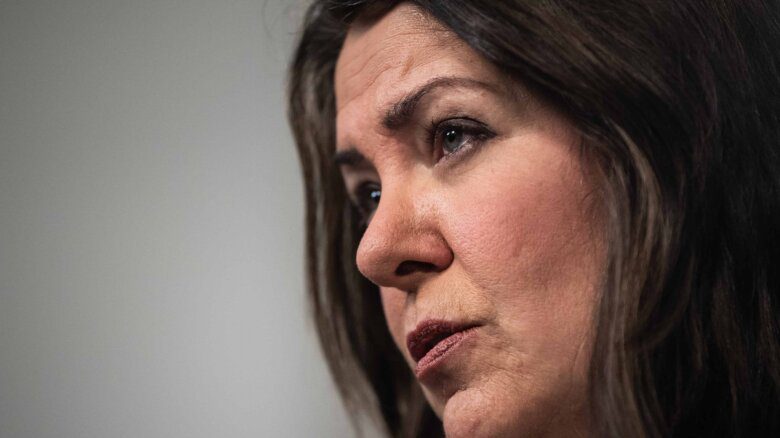When Kat Enyeart was growing up in Portland, Oregon, there was little affirmation, let alone support, for her identity. “I knew that I was trans with 100 percent certainty when I was in kindergarten,” says the 35-year-old multidisciplinary designer. But living with her unsupportive evangelical family left her feeling hopeless. “I really set my sights on just dying.”
Enyeart struggled for years in her early adulthood, surviving financially through sex work until she finally found a supportive LGBTQ2S+ community in Oregon, centred on radical activism. They showed her the support necessary to access competent health care, start a new career and build the future she believed impossible as a closeted trans kid. These experiences have echoed through her head as conservative legislators across the United States unleash what has become a multi-year legislative attack on trans people. Anti-trans bills have been travelling through state legislatures, often framed by lawmakers as a form of “protection” for kids. Critics, however, argue these laws are acutely harmful to trans children who are already at a heightened risk of depression, suicidal ideation and transphobic attacks.
This year has already seen the introduction of almost 240 anti-LGBT state bills, many targeting trans people by blocking trans students from participation on sports teams, disallowing access to school bathrooms that best align with their identity and denying them access to health care. Under a recent Idaho bill, for example, practitioners who make trans-related care accessible to youth could face a life sentence in prison. Alabama legislators want to prohibit not only trans students from restrooms, but also deny gender-affirming care to anyone under 19 and force teachers to “out” trans kids without regard to their safety.
This crisis has motivated organizations around the country to mobilize against the onslaught, but many activists have noticed a dearth of groups centring trans issues that are willing to use confrontational tactics, like protests, to disrupt the day-to-day operations of organizations threatening trans communities.
With that in mind, Enyeart and others dug into their networks, speaking with organizers from historic queer organizations that fought during the HIV crisis. The activists knew that further inaction would create a lethal nightmare for the queer communities being targeted; these bills, they felt, required immediate—and dramatic—interventions by organizers to draw attention. This led to the creation of a new organization called Tear It Up, which seeks to intervene as legislative attacks against trans people multiply.
“I know what it looks like and feels like to grow up as a trans child in a world that you know unambiguously despises you and wishes you death,” says Enyeart, who herself struggled with suicidal ideation and says she currently loses about one trans friend a year to suicide. The argument that Enyeart and other trans activists around the country are making is that with supportive communities and trans-affirming health care, many of the risk factors that haunt trans youth can be alleviated. She, alongside other Tear It Up members, hopes to bring a more direct, action-focused approach to the fight against anti-trans measures, using public demonstrations to force the issue into the spotlight.
“We’re a community that overwhelmingly struggles with houselessness and job discrimination and inability to access basic health care and human services,” says Ada-Rhodes Short, a Nebraska-based organizer who co-created Tear It Up with Enyeart and about a dozen others. “If we lose all of these states, nowhere is safe. People shouldn’t be expected to have to become refugees from their own government, just for trying to access basic fucking health care.”
This is why Tear It Up is looking at anti-trans measures as a health care issue—they believe attacking access is a direct assault on the ability of trans people to live healthy lives. Activists looked to another movement from LGBTQ2S+ history that bridged health care concerns with queer affirmation: the AIDS Coalition to Unleash Power, or ACT UP. The organization took on the U.S. government and health care system in the 1980s and early ’90s at a time when no research, money or support was provided to those facing HIV, many of whom were queer. Instead of simply lobbying for more funding for HIV and AIDS-related care, ACT UP staged confrontational, in-your-face actions like “die ins” at religious and public venues to show that state inaction had deadly consequences.
Short connected with early ACT UP organizer Brian Zabcik when she was organizing in Austin, Texas, and turned to him for advice about the kinds of organizing strategies Tear It Up might try. “Frankly, nobody wants to hear [trans people], or see us, and it’s got a lot of parallels to the ways people viewed AIDS and HIV activism back in the day,” says Short.
Enyeart, for her part, reached out to Christopher Leone, a member of the collective that created the “Silence = Death” logo, which became a hallmark of HIV/AIDs activism during the 1980s. “We know that we want to make people care about this issue. So I wanted to … ask what the strategy was for these incredibly influential and famous protest graphics,” says Enyeart, who got permission to repurpose the Silence = Death graphic for Tear It Up’s campaign. “We want to connect to those tried and true tactics that ACT UP championed as a way to garner media intention. To inject real trans suffering into this national conversation that’s being had about us without us.”
“We need to be more annoying. Need to be louder. We need to be an inconvenient target,” says co-founder Ada-Rhodes Short.
Tear It Up’s first major public actions will take place this week. They’re raising the issue by staging “die ins” in at least five state capitals, including Idaho, Texas, Iowa, Georgia and Florida on March 31, the Trans Day of Visibility (TDoV). While they intend on collaborating with establishment queer groups like The Trevor Project, an advocacy organization formed to confront the crisis of trans suicide, Tear It Up will employ more confrontational tactics that many advocacy groups feel unable to perform.
“We need to be more annoying. Need to be louder. And more visible and we need to be an inconvenient target,” says Short, who wants to ensure that trans kids in red parts of the country can see someone fighting for them. While many LGBTQ2S+ advocacy groups make gains through quiet negotiation and policy proposals, they are often less than visible to the public and need a counterpart that can escalate the messaging. By staging confrontational protests, Tear It Up activists hope to make the issues of trans suicide and violence a visible, and demand that the public take action to stop the advance of transphobic policies. They want to show a new generation of activists that they can fight back themselves.
Tear It Up is only one piece of the larger web of organizations that will be necessary to counter the anti-trans legal assault, and they intend on building up networks across the country. The Republican Party has shown that anti-trans measures could be a key part of their platform in upcoming elections, and grassroots organizers like Enyeart are digging in for what could be a years-long fight to protect lifesaving health care and community measures. After their initial actions, the group wants to expand to create mutual aid projects that can support the trans community with resources, and push for more actions that can publicly make the case that anti-trans politics are an attack on the existence of trans people themselves.
For Enyeart, this raises visibility and makes trans suffering unignorable. “Part of our mission needs to be to make trans people and trans pain visible to people who otherwise can live their entire lives without having any reason to give a shit.”


 Why you can trust Xtra
Why you can trust Xtra


